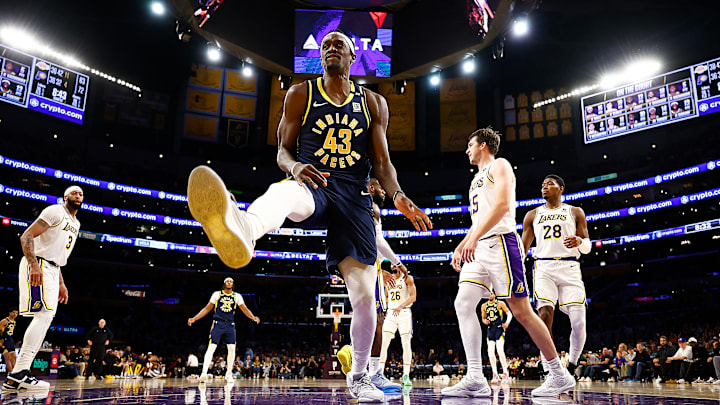Yeah, not much you can do about that one.
The Pacers' 145-150 loss to the Los Angeles Lakers is another addition to the pantheon of frustrating losses this season, except this one had extra salt rubbed into the wound. Going into this matchup, Indiana sat one game above the Heat and 76ers in the standings after both of those teams won their Sunday matchups.
A win against LA could propel the Pacers back ahead 1.5 games, whereas a loss could drop them back to only half a game ahead. With another game coming up the very next day, it would be crucial to get an extra win on their first night at Crypto Arena.
At first, it seemed like Indiana knew exactly what they needed to do. Following a balanced scoring effort including 50% from the field and beyond the arc, the Pacers led 36-30 after the first quarter despite shooting 1/5 from the free throw line. After plenty of middling first-quarter performances before this, it was nice to see Indiana finally take advantage and get out to a big lead, thanks in part to the momentum created by Pascal Siakam's thunderous dunk over Taurean Prince and Anthony Davis.
PASCAL SIAKAM JUST PUT TAUREAN PRINCE AND ANTHONY DAVIS ON A T-SHIRT pic.twitter.com/QzxPDUa0yO
— The House that Kami Built (@KamitronPTW) March 25, 2024
Unfortunately, the Pacers had to face an 8 on 5 advantage the rest of the way, as the foul differential tipped a certain way after the first quarter. After only committing four fouls in the first quarter, the Pacers were called for 10 fouls in the second compared to the Lakers' three fouls. In addition, the Lakers shot 12 free throws compared to the Pacers' five.
Perhaps the most frustrating calls came within seconds of each other, as after Aaron Nesmith was called for a blocking foul despite being trucked into, Obi Toppin was whistled for a charge despite Taurean Prince's feet not being set at the time. What was even more baffling was the fact that this call stood after a Pacers challenge despite all angles showing the movement of Prince's feet upon contact.
Because of these bogus calls, and the Lakers shooting a scorching-hot 63% from the field and 66% from deep in the second quarter, LA took a 68-72 lead going into halftime. Notably, the foul difference at halftime was 14 for Indiana compared to nine for LA and 10 free throws for Indiana compared to 19 for LA.
Surely it couldn't get worse, right? Right?
Wrong. In the third half, the calls got even more egregious, with the Pacers committing nine fouls compared to only one for the Lakers. Coincidentally, the Pacers only shot one free throw in the third quarter while the Lakers shot thirteen, increasing the free-throw discrepancy to 33 vs 11.
Unfortunately, despite Pascal Siakam's 36 points and a valiant comeback effort sparked by Indiana's bench in the fourth quarter, the free throw differential was too much to overcome and the Pacers lost 145-150 in the end. Of course, fans were not exactly surprised by referee favoritism going into this game, as the Lakers were at risk of missing the playoffs and the game was in LA, but the sheer difference in fouls and free throws was still something to marvel at.
Discounting the six garbage time fouls by the Pacers and the 10 extra free throws that resulted, the Pacers committed 25 total fouls compared to the Lakers' 14 and only shot 16 free throws compared to the 33 non-garbage time free throws shot by LA.
While it is true that the Lakers are not a shooting team and drive to the rim quite often, Indiana is quite the same. It is baffling for a team that scores in the paint as much as the Pacers do to shoot as few free throws as they usually get, especially when a similar driving and finishing team is getting more than twice as many free throws on the same court in the same game.
Even more puzzling, there seemed to be a direct correlation between the Lakers getting more fouls, and a long mid-game meeting between LeBron James, Anthony Davis, and Head Official Marc Davis before Myles Turner shot free throws. After this short meeting, the Lakers got 13 foul calls in their favor compared to only one for Indiana.
7 fouls were called against the Pacers after AD and LeBron had their 30 second “meeting” with Head Official Marc Davis before Myles Turner was finally allowed to shoot his free throws.
— Alex Golden (@AlexGoldenNBA) March 25, 2024
In addition to that, the Lakers were called for…ZERO fouls after that “meeting”.
While there were other factors that played into Indiana's loss, namely the complete lack of defense, and Tyrese Haliburton's passiveness, although he did help keep it a close game late, it ultimately has to come down to the free throw difference. As some have said in the past, you have to beat the Lakers by 20 to beat them by one, and that was clearly evident on Sunday.
After the loss, Indiana sits only half a game ahead of Philly and Miami with a real chance of falling back into the play-in after Monday's game against the Clippers. This loss put Indiana back in the unfavorable position they got themselves out of after Friday's game, and they will have to play especially hard on Monday night to get themselves back into good shape.
